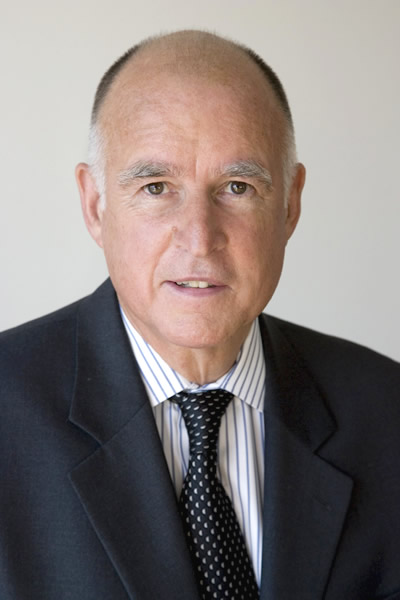News
Anti-trans referendum won’t make 2014 California ballot
Opponents of law found to be 17,276 short of valid names


Gov. Jerry Brown signed a law that says schools must allow trans students to use the bathrooms and locker rooms and play on sports teams that match their gender identification. (Photo public Domain)
Despite the efforts of anti-transgender groups, a referendum on a law allowing California students to participate in student activities in accordance with their gender identity won’t appear before state voters in 2014.
On Monday, California Secretary of State Debra Bowen announced via Twitter that the signature check on the referendum for the law, known as the School Success & Opportunity Act, didn’t yield enough valid signatures to place the measure on the state ballot. A spokesperson for the office confirmed for the Blade the measure failed to qualify.
After a signature-check process that lasted months, state officials found opponents of the law submitted 487,484 valid names — which is 17,276 short of the necessary 504,760 names to qualify. They submitted 619,387 names, but 131,903 were deemed invalid.
The law, signed by California Gov. Jerry Brown on Aug. 13, requires California public schools to respect students’ gender identity and ensures transgender students have access to school activities, facilities and sports teams in accordance with their gender identity. But critics say it violates the rights of students who may feel uncomfortable sharing facilities with someone of a different biological sex.
LGBT advocates responded to the news by saying the law, which went into effect Jan. 1, ensures all students, including those who are transgender, can do well in school.
Masen Davis, executive director of the San Francisco-based Transgender Law Center, said the law fosters a positive environment for students in California schools.
“This law gives schools the guidelines and flexibility to create an environment where all kids have the opportunity to learn,” Davis said. “We need to focus on creating an environment where every student is able to do well and graduate. This law is about doing what’s best for all students — that’s why it’s supported by school boards, teachers, and the PTA.”
The Transgender Law Center is part of a coalition known as the Support All Students campaign, which consists of nearly 100 state and national organizations including Equality California, National Center for Lesbian Rights, ACLU of California, Gay-Straight Alliance Network, the L.A. Gay & Lesbian Center and Gender Spectrum.
Chad Griffin, president of the Human Rights Campaign, said the failure of the referendum to qualify for the ballot reflects the growing support for transgender rights.
“The forces of discrimination tried to go after California’s LGBT young people, and it’s a sign of our progress that they fell short of their goal,” Griffin said. “Yet unfortunately there are groups out there that are actively working to make the lives of LGBT youth harder. This law does nothing more than safeguard transgender students from being excluded and ensures all students are provided the same opportunities – regardless of gender identity.”
The lack of insufficient valid signatures to place the measure on the ballot isn’t surprising. John O’Connor, executive director of Equality California, predicted in November that it was “unlikely, [but] it’s not impossible” for the measure to qualify given the signature validation rate at that point.
Enough signatures deemed valid last month after a randomized spot-check was conducted to trigger a full count of all of the signatures acquired in the 58 counties. But, as revealed on Monday, the full count revealed the anti-trans campaign had failed to gather enough names to put the issue up for referendum.
Brad Dacus, president of the Pacific Justice Institute, nonetheless vowed in a statement to continue the fight against the trans student law through other means.
“Make no mistake, Pacific Justice Institute is committed to protecting the privacy of children,” Dacus said. “We are ready to review and challenge every signature that was not counted towards the referendum of this impudent and in-your-face bill. Our children’s privacy is worth doing all that we can.”
The statement says the Privacy for All Students, the coalition behind the referendum effort, has a right to review and appeal to the courts each of the around 131,000 signatures that were rejected. Additionally, the organization “to defend any child who has their privacy rights violated” because of the trans law.
It’s also still possible for opponents of the law to repeal it through a separate ballot initiative process different from the referendum process. But the deadline has passed for such a measure to qualify for the 2014 ballot, so the soonest that would be is 2016. A statutory ballot initiative would require 504,760 signatures to qualify for the ballot; a constitutional amendment would require 807,615 names.
Erik Olvera, spokesperson for the National Center for Lesbian Rights, said the odds aren’t favorable for path anti-trans groups have to strip the student law from the books.
“They would have to do an initiative or go to the legislature — both very hard,” Olvera said.

The Mexican Senate on Thursday approved a bill that would ban so-called conversion therapy in the country.
Yaaj México, a Mexican LGBTQ rights group, on X noted the measure passed by a 77-4 vote margin with 15 abstentions. The Chamber of Deputies, the lower house of Mexico’s congress, approved the bill last month that, among other things, would subject conversion therapy practitioners to between two and six years in prison and fines.
The Senate on its X account described conversion therapy as “practices that have incentivized the violation of human rights of the LGBTTTIQ+ community.”
“The Senate moved (to) sanction therapies that impede or annul a person’s orientation or gender identity,” it said. “There are aggravating factors when the practices are done to minors, older adults and people with disabilities.”
Mexico City and the states of Oaxaca, Quintana Roo, Jalisco and Sonora are among the Mexican jurisdictions that have banned the discredited practice.
The Senate in 2022 passed a conversion therapy ban bill, but the House of Deputies did not approve it. It is not immediately clear whether President Andrés Manuel López Obrador supports the ban.
Canada, Brazil, Belgium, Germany, France, and New Zealand are among the countries that ban conversion therapy. Virginia, California, and D.C. are among the U.S. jurisdictions that prohibit the practice for minors.
The White House
Four states to ignore new Title IX rules protecting transgender students
Biden administration last Friday released final regulations

BY ERIN REED | Last Friday, the Biden administration released its final Title IX rules, which include protections for LGBTQ students by clarifying that Title IX forbids discrimination based on sexual orientation and gender identity.
The rule change could have a significant impact as it would supersede bathroom bans and other discriminatory policies that have become increasingly common in Republican states within the U.S.
As of Thursday morning, however, officials in at least four states — Oklahoma, Louisiana, Florida, and South Carolina — have directed schools to ignore the regulations, potentially setting up a federal showdown that may ultimately end up in a protracted court battle in the lead-up to the 2024 elections.
Louisiana State Superintendent of Education Cade Brumley was the first to respond, decrying the fact that the new Title IX regulations could block teachers and other students from exercising what has been dubbed by some a “right to bully” transgender students by using their old names and pronouns intentionally.
Asserting that Title IX law does not protect trans and queer students, Brumley states that schools “should not alter policies or procedures at this time.” Critically, several courts have ruled that trans and queer students are protected by Title IX, including the 4th U.S. Circuit Court of Appeals in a recent case in West Virginia.
In South Carolina, Schools Supt. Ellen Weaver wrote in a letter that providing protections for trans and LGBTQ students under Title IX “would rescind 50 years of progress and equality of opportunity by putting girls and women at a disadvantage in the educational arena,” apparently leaving trans kids out of her definition of those who deserve progress and equality of opportunity.
She then directed schools to ignore the new directive while waiting for court challenges. While South Carolina does not have a bathroom ban or statewide “Don’t Say Gay or Trans” law, such bills continue to be proposed in the state.
Responding to the South Carolina letter, Chase Glenn of Alliance For Full Acceptance stated, “While Supt. Weaver may not personally support the rights of LGBTQ+ students, she has the responsibility as the top school leader in our state to ensure that all students have equal rights and protections, and a safe place to learn and be themselves. The flagrant disregard shown for the Title IX rule tells me that our superintendent unfortunately does not have the best interests of all students in mind.”
Florida Education Commissioner Manny Diaz also joined in instructing schools not to implement Title IX regulations. In a letter issued to area schools, Diaz stated that the new Title IX regulations were tantamount to “gaslighting the country into believing that biological sex no longer has any meaning.”
Governor Ron DeSantis approved of the letter and stated that Florida “will not comply.” Florida has notably been the site of some of the most viciously anti-queer and anti-trans legislation in recent history, including a “Don’t Say Gay or Trans” law that was used to force a trans female teacher to go by “Mr.”
State Education Supt. Ryan Walters of Oklahoma was the latest to echo similar sentiments. Walters has recently appointed the right-wing media figure Chaya Raichik of Libs of TikTok to an advisory role “to improve school safety,” and notably, Raichik has posed proudly with papers accusing her of instigating bomb threats with her incendiary posts about LGBTQ people in classrooms.
The Title IX policies have been universally applauded by large LGBTQ rights organizations in the U.S. Lambda Legal, a key figure in fighting anti-LGBTQ legislation nationwide, said that the regulations “clearly cover LGBTQ+ students, as well as survivors and pregnant and parenting students across race and gender identity.” The Human Rights Campaign also praised the rule, stating, “rule will be life-changing for so many LGBTQ+ youth and help ensure LGBTQ+ students can receive the same educational experience as their peers: Going to dances, safely using the restroom, and writing stories that tell the truth about their own lives.”
The rule is slated to go into effect Aug. 1, pending any legal challenges.
****************************************************************************

Erin Reed is a transgender woman (she/her pronouns) and researcher who tracks anti-LGBTQ+ legislation around the world and helps people become better advocates for their queer family, friends, colleagues, and community. Reed also is a social media consultant and public speaker.
******************************************************************************************
The preceding article was first published at Erin In The Morning and is republished with permission.
South America
Argentina government dismisses transgender public sector employees
Country’s Trans Labor Quota Law enacted in 2021

Protests have broken out across Argentina in recent weeks after the dismissal of transgender people from their government jobs.
President Javier Milei’s action is in stark contract with the progress seen in 2023, where the government’s hiring of trans people increased by 900 percent within the framework of the Trans Labor Quota Law that had been in place since 2021.
Among those affected is Sofia Diaz, a “survivor” who shared her testimony with the Washington Blade hours after she traveled from Chaco Province to Buenos Aires to protest her dismissal.
Presentes, an LGBTQ news agency, reported the government dismissed more than 85 trans employees in less than two weeks.
Diaz, 49, holds a degree in combined arts. She joined the National Social Security Administration (ANSES) in 2022 under the Trans Labor Inclusion Law. The layoffs began in January and left many people feeling uncertain and anguished. It was her turn a few days ago.
Diaz in an interview recounted how the situation became progressively more complicated, with difficulties in accessing information about her employment status and the eventual confirmation of dismissals through WhatsApp messages. This government action, according to Diaz, violates the law.
“We were on a Friday, I think on March 24, in the office and we have a WhatsApp group of other colleagues from all over Argentina who entered through the trans labor quota and they tell us if we can get our pay stubs on the intranet,” Diaz recalled. “So, I tried to enter, I could not, I talked to two other colleagues and they told me no, they could not, and so we went to another person. He couldn’t either.”
“Some people told us that it could be a system error. Well, we were never calm, let’s say not how this issue of installing fear and the perversion with which they do it ends,” she added. “This sadism of … inflicting pain and speculating with your misfortune and so on … is something that characterizes Javier Milei’s government.”
Diaz recalled a list of those dismissed from the agency began to circulate from the union in the afternoon. A colleague passed it on to her, “and well, unfortunately I was also on that list.”
“At that moment the whole weekend went by with anguish, crying, and talking with other colleagues from other places, not only trans, but everyone, everyone and everyone,” she said. “On Monday when we went to try to enter, we could not enter with the biometric, which is the thumb we had to use every morning to enter.”
Despite the difficult moment through which she is going, the trans activist stressed to the Blade that she will continue protesting and will even sue the government because her dismissal is illegal and “violates the constitution itself.”
The LGBTQ community and its allies have mobilized and organized demonstrations, highlighting the importance of defending the rights won and fighting against discrimination and exclusion. Diaz emphasized the fight is not only for the people affected today, but also for future generations, saying the historical memory of the struggles for inclusion and social justice must be kept alive.
“The Argentine government thus faces a key challenge in human and labor rights, where public pressure and social mobilization can play a determining role in protecting the rights of LGBTQ+ people,” Diaz said.
-

 State Department3 days ago
State Department3 days agoState Department releases annual human rights report
-

 South America1 day ago
South America1 day agoArgentina government dismisses transgender public sector employees
-

 Maryland5 days ago
Maryland5 days agoJoe Vogel campaign holds ‘Big Gay Canvass Kickoff’
-

 District of Columbia1 day ago
District of Columbia1 day agoCatching up with the asexuals and aromantics of D.C.











